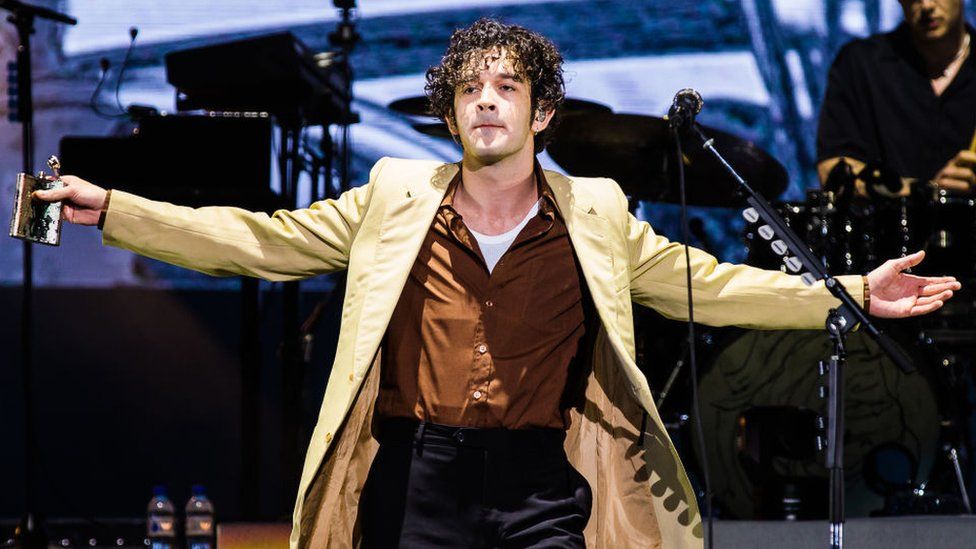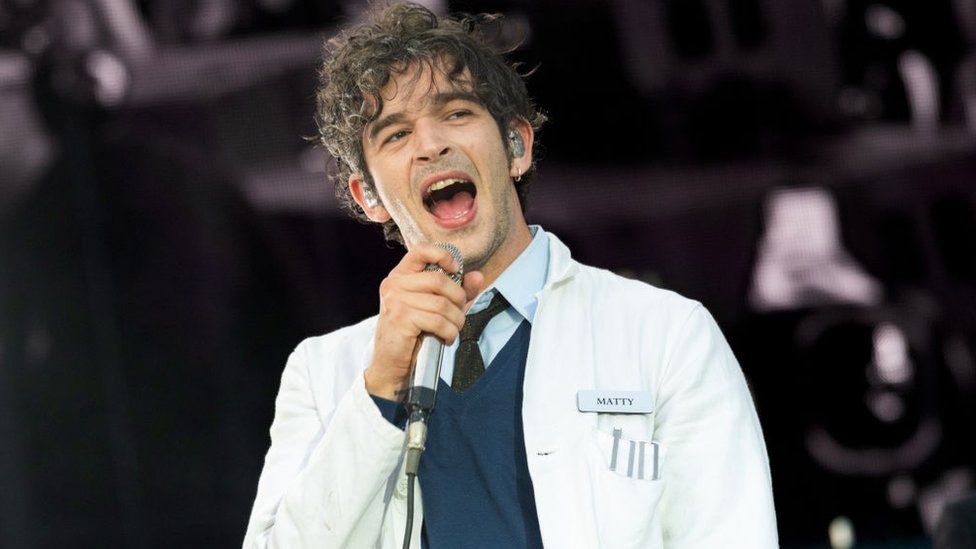
British pop singer Matty Healy’s protest stunt at a concert in Malaysia has sparked fury from LGBT activists and allies in the country.
Many have described the 1975 singer’s sweary rant at the Malaysian government – and kiss with a male bandmate – as an act of “performative activism” that would make their lives even harder.
Homosexuality remains a crime in Malaysia, punishable by up to 20 years in prison. Conservative Islam remains the dominant political and cultural force in the country, restricting sexuality, alcohol and other perceived threats to traditional values and “public decency” standards.
In a statement after Friday’s show, a source close to the band said Healy had wanted to stand up for the LGBT community.
But while many locals appreciated the intent, they say he crashed a precarious political environment for LGBT Malaysians and caused greater damage.
“Unfortunately, local activists are now having to deal with the fall-out and the potential policies and restrictions that might come from it,” said Dhia Rezki, an activist with Kuala Lumpur-based support group JEKAKA.
What did Healy do?
Last Friday, indie-pop band The 1975 was headlining a music festival in the capital Kuala Lumpur when Healy – who has a history of derogatory comments about women and minorities – launched into a tirade against Malaysia’s anti-LGBT laws and kissed his bandmate in protest.
He had already been drinking on stage and destroyed a drone belonging to concert organisers. Attendees reported him spitting on fans.
Swaggering around the stage, the 34-year-old insulted the Malaysian government and said he was “furious” he’d made “a mistake when we were booking shows”.
“I don’t see the [expletive] point, right, I do not see the point of inviting the 1975 to a country and then telling us who we can have sex with,” he said.
“I’ll take your money, you can ban me, but I’ve done this before and it doesn’t feel good,” he said. He then grabbed his bandmate’s face and kissed him.
The band’s set was shut down soon after. “Alright, we just got banned from Kuala Lumpur, see you later,” he yelled to the audience.
The next day authorities ordered the closure of the entire Good Vibes festival which still had two days to go and other international acts due to perform like The Kid Laroi, The Strokes and Ty Dollar $ign. Festival goers had paid hundreds of dollars to attend, many travelling from other parts of Southeast Asia.
Healy and his band flew out a few hours later. They cancelled the rest of their Asia tour dates – they’d also been due to play in devoutly Muslim Indonesia and Taiwan.
What’s the response?
While Healy was ranting to the crowd in Kuala Lumpur, he said: “I’m sure a lot of you are gay and progressive and cool” – comments which drew scattered cheers.
But videos from the night also show the audience’s silence and fans’ growing unease. TikToks show people’s faces falling and locals grimacing.
“Just sing the damn song,” mutters one girl in a pink headscarf and glittery eye make-up. “I mean you come here and then insult our country…” she says, swapping glances with her friend in the clip viewed millions of times. She captioned the video “Iykyk”.
That was reflective of the broader reaction across Malaysian social media on the weekend.
The TikTok commentary was overwhelmingly critical, and in many of the most popular videos, young LGBT Malaysians are furious.
“I’m seeing a lot of like ‘Oh Matt Healy stood up for the rights of the Malaysian queer community’ – No, Matt Healy, you’re an idiot. Do you have any idea of repercussions… do you have any idea how hard it is for queer people to just exist now?” one user said in another TikTok that’s been viewed more than 2m times since Saturday.
“I hate this white saviour complex of people coming to regions like Southeast Asia – with no prior research whatsoever to what the culture is, or the repercussions of doing acts like this – and ruining it not for them but for the people who actually live here.”

Young Malaysians told the BBC they felt the act reflected a patronising Western attitude to Asia.
“It is very reminiscent of the whole white saviour complex, this narrative again and again of how ‘uncivilised or un-progressive’ the people in the East are and how the white person has to come into a country to save or better the people,” said Dee May Tan, an arts creative in Kuala Lumpur.
“The way he went about it was just purely culturally insensitive. Like it’s very self-righteous, entitled, ignorant and doesn’t gel with what he’s trying to promote.”
The criticism is in part also fuelled by Healy’s reputation. There’s a long-running internet joke that his bandmates cut him off on stage before he says something problematic. British-Japanese singer Rina Sawayama at Glastonbury last month called him out for his racist comments about Asian people.
Earlier this year in a podcast, he mocked American rapper Ice Spice, mimicked Asian and Hawaiian accents and asked the show’s hosts to do impressions of Japanese people labouring in concentration camps. He has apologised for some of the comments, saying people misinterpreted his sense of humour.
LGBT community fears reprisals
Healy had tried to do the right thing, but in the wrong way, suggested artist Jerome Kugan, who recently organised an exhibition in Kuala Lumpur allowing local LGBT artists to showcase their works.
“I understand and commend him for wanting to express his opinions about the regressive laws against LGBTQ+ folks in Malaysia and other parts of the world,” he said. “But I think he could’ve chosen a more conducive platform to do it.”
Malaysian activist Dhia Rezki also felt Healy’s protest message was genuine but feared his high profile stunt could reinforce LGBT repression.
Conservative groups have described the incident as a violation of “family values” and could point to it as evidence of the LGBT community “taking things too far, crossing the line”, he said.
“They’ll use it to target anything done by LGBT people, be it holding hands, kissing or even posting about relationships online.”
Malaysia has seen a noticeable shift to more conservative parties advocating harsher laws. There is outright state hostility.
Former Prime Minister Muhyiddin Yassin, in office 2020-2021, described LGBT people as a threat to Islam, backed by “foreign influences”. He said they had a “disorder” that requires counselling.
Malaysia is ranked the second-worst place for transgender people in the world, and one study by local advocates Pelangi Campaign found nearly half of those who identify as LGBT have faced harassment and threats.
And while there are more open-minded views in cities like Kuala Lumpur, it’s different in other parts of the country.
“We’re still seeing people fired due to their sexual orientation, young people are outed, bullied or evicted,” said Mr Rezki.
“We agree that visibility is important, and at some point, we would like to have more public displays of our activism, but we have always planned carefully around how we intend to do it so that members of our community are not jeopardised.”


